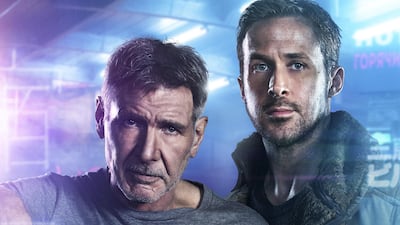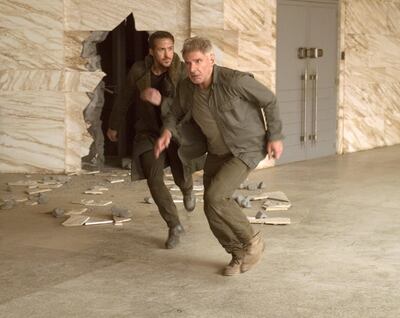Harrison Ford's reputation undoubtedly precedes him – not only as one of the leading actors of his generation, having portrayed movie icons such as Star Wars' Han Solo, Raiders of the Lost Ark's Indiana Jones and, of course, Blade Runner's Rick Deckard – but also as a notoriously media-shy individual who sees the need to communicate with his public (or "customers" as he regularly refers to them) as a most unwelcome side product of his job.
The star famously admitted to the BBC he is "just rude" and for years refused to answer questions about probably his most celebrated role as Han Solo. He even gave a wry nod to his own acerbic reputation with a staged walk out on the Jimmy Kimmel Live show, when an audience member dressed as Chewbacca threw him a Star Wars question (in his native Wookie language, naturally) during a Q&A.
It was with some relief then, that the Ford we sat down with in a hotel room in Berlin recently to discuss the forthcoming Blade Runner 2049 film, in which he reprises his role as Deckard, was quite the opposite of the daunting media-phobe we had feared. In fact, he seemed to have sparked up a comedy double act with his co-star Ryan Gosling over the course of shooting, and the gags came thick and fast from the outset.
What is the relationship between the two characters? "I had his job once. I was good at it," Ford quips, mimicking his own line from the film's trailer – it's clear we may not get too many serious responses here.
I divert my attention to his co-star Gosling, and ask about his own memories of the 1982 original movie: "I saw it when I was about 12, about 10 years or so after it came out. I really had no idea of its significance at the time," he reveals, before his partner-in-mirth cuts him dead.
"He rented it for a dollar. He got four movies for a dollar. It was a summer special," Ford deadpans.
Gosling confirms the story, and Ford finally lets him talk a little more about his response. "It was unlike anything I'd experienced before," he says. "It was transportive, very complicated emotionally. I wasn't sure how I was supposed to feel. It felt very grounded and possible, but at the same time it felt like this romantic nightmare. There were so many elements to it and when it was over it took me a while to realise how important it was and how much it had influenced a whole generation."
The sheer force of Ford's personality is already governing the direction of our meeting, and its clear that his presence loomed large over the set too. "We were all very concerned about what Harrison would think and how he would like what we were doing," says Gosling. "Every day Jared [Leto, who plays Niander Wallace in the film] and me were like, 'Is Harrison going to like this?' He was like our bulls*** meter, and a great one at that. He really helped us navigate our course and he was there to ask, if we ever needed to."
"They never asked me," Ford retorts.
Whether the new generation of Blade Runner stars consulted Ford or not, it sounds like the time they spent on set was a riot, particularly given the fact that the film is such a bleak affair. The two engage in a protracted faux-argument about who had the bigger trailer, before Gosling reveals how he dealt with the intimidating prospect of appearing in an iconic movie alongside one of his heroes. "He does a lot of his off-camera in UGG boots with a cashmere wrap; that kind of takes away the intimidation," he reveals. "I think he did it for me more than his own comfort, although I found it quite uncomfortable too."
Ford, not to be outdone, has to have the last word and reveals his own special technique for making his starstruck co-star feel at ease: "I don't think the crew was totally comfortable with the nudity, but for you I knew it would be a distraction."
With the conversation clearly taking another turn for the surreal, I try to steer Ford back to the movie – how was it returning to Blade Runner second time around after a massive 35-year gap? "There was less rain, less strain, less night-time work, and I had 35 years to think about it," he says. "It was fun. It really was. Any doubts I had about doing it were swiftly assuaged by the script we had. That's what we tried to preserve – the audience potential not to hear about [the story] from me as a hawker of my wares, or from you as a journalist, but to have the opportunity to, in context, discover things. I like an audience to experience the story. My most critical script note in the margin is 'talk story', talking about the story … giving the audience the opportunity to experience the story."
The original movie is, of course, a cult classic. Its fame, however, has largely come through home video, DVD and a slow-burning loyal fan base. Its original theatre release drew in a modest US$33.8 million (Dh124.1m) at the global box office, and was viewed by many at the time as a failure. Ford is quite clear on what does, and does not, constitute failure. "It may have been by some interpretations a failure. For me it couldn't have been a failure because it was a very useful experience and it wasn't my money, so I wasn't concerned about that aspect of it," he says frankly. "It gave me the opportunity to have an experience the like of which I'd never had before. To work with a different mindset in terms of some of the people involved, to face challenges that I hadn't faced before. It helped me understand my craft and myself better. It wasn't a failure."
Ford does concede that not everyone may have shared his viewpoint about the film's success at the time, however. "What it was was, it did not meet expectations in terms of making the studio its money as quickly as they spent it," he says. "But it found an audience, an audience with enough loyalty, it found many visual artists who were inspired by the vigorous visual art that Ridley [Scott, director] has created, it gave them a lot of inspiration. I can't tell you how many times I hear from filmmakers that what inspired them was Ridley Scott's Blade Runner, Denis [Villeneuve, director of Blade Runner 2049] being one of them. So, is it a failure?"
That's a question that history has already answered comprehensively. The initial cinema release may have been underwhelming, but video and DVD sales, boosted by Scott's Director's Cut in 1992 and Final Cut in 2007 have more than countered that initial disappointment.
The film reinvented the sci-fi genre, giving birth to a brand new genre – future-noir – and inspiring almost every sci-fi film that would follow.
The movie's fans are legion. Now, it's up to Blade Runner 2049 to take that legacy forward.
________________
Read more:
Villeneuve on how he made the cut, and a Middle East casting call
Blade Runner 2049 director Denis Villeneuve: Deckard is human
Blade Runner 2049 director Villeneuve's 'love' for original propels it forward
________________


